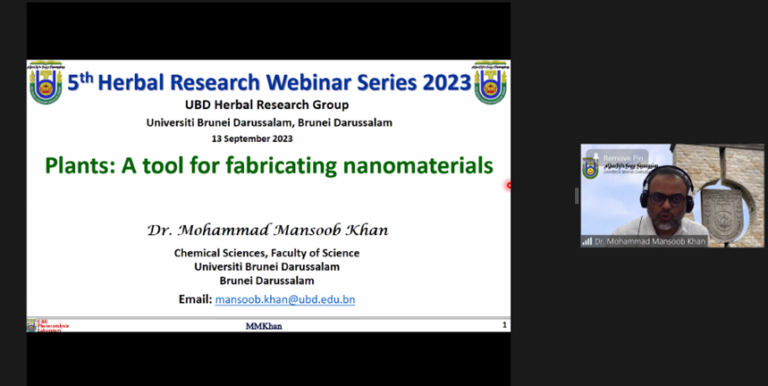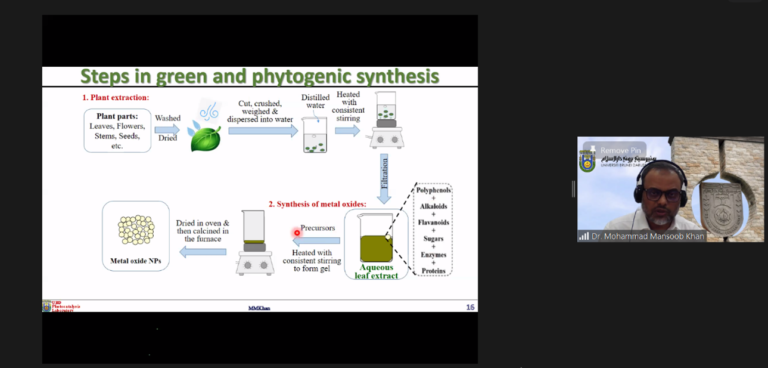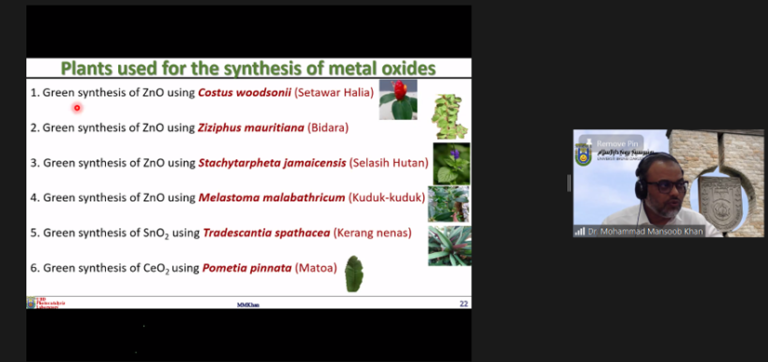The 5th Herbal Research Webinar Series 2023 was conducted online via Zoom on 13th September 2023, hosted by the Herbal Research Group of Universiti Brunei Darussalam (UBD). Associate Professor Dr. Mohammad Mansoob Khan who is currently working at Chemical Sciences, Faculty of Science, UBD was invited as the guest speaker for the event. Dr. Mansoob’s research interests and specialties are in the cutting-edge areas of nanochemistry, nanosciences, nanotechnology, material sciences, and materials chemistry, especially in the field of inorganic and nanohybrid materials such as synthesis of noble metal nanoparticles, metal oxides, chalcogenides, and their nanocomposites for various applications. During the webinar, Dr. Mansoob shared about his research work in a talk entitled “Plants: A Tool for Fabricating Nanomaterials”. A total of 52 participants including staff, students and alumni from different faculties and departments of UBD, Ministry of Health, Institute of Brunei Technical Education (IBTE) Agro-Technology, and Jerudong Park Medical Centre (JPMC) attended the event.

Dr. Mansoob began his presentation by elucidating that phytochemicals such as alkaloids, polyphenols, and flavonoids from extract can be used as a tool to synthesise the different types of nanomaterials which can be used for various applications. He then listed out the general methods available to synthesise nanomaterials including the physical, chemical, and hybrid approaches. Nevertheless, he specifically focused on the biological or green synthesis of metal oxides and doped-metal oxides using aqueous plant extract as this approach is considered to be a clean approach because it utilizes a green solvent and takes place at room temperature and pressure. Additionally, this approach minimizes the adverse effects on the environment and human health, reduces or eliminates the use and/or the formation of toxic and hazardous substances, encourages the employment of new protocols that are more environmentally friendly and pose a low risk to human health and most importantly prevent pollution at the molecular level. Dr. Mansoob then proceeded to further elaborate on the 12 principles of green synthesis, the steps involved in the synthesis in which he emphasised the importance of choosing the right plant samples to be extracted and using water as the solvent for extraction. Lastly, he then illuminated the factors such as extraction methods, plant extract to precursors ratio and calcination temperature may affect the green synthesis of metal oxides.

Dr. Mansoob then shared the local plants of different plant parts that have been studied for the synthesis of metal oxides in UBD and this includes the green synthesis of ZnO using Costus woodsonii (Setawar halia) leaf and bulb aqueous extracts, Mg and/or Cu-doped ZnO using Ziziphus mauritiana (Bidara) leaf aqueous extract in which different antioxidant and antibacterial activities were observed, ZnO and Cu-doped ZnO using Stachytarpheta jamaicensis (Selasih hutan) aqueous leaf extract and ZnO and Mn-doped ZnO using Melastoma malabatricum (Kuduk-kuduk) aqueous leaf extract, green synthesis of , Ni-doped and Co-doped using Tradescantia spathacea (Kerang nenas) aqueous leaf extract and lastly green synthesis of , Zr-doped and Sn-doped using Pometia pinnata (Matoa) aqueous leaf extract. Dr. Mansoob then ended his presentation by describing the advantages and disadvantages of green synthesis.

To conclude the webinar, a virtual group photo session was taken with the participants followed by an intriguing question-and-answer session between the participants and Dr. Mansoob. A video recording of the 5th Herbal Research Webinar Series 2023 can be accessed via https://youtu.be/xBUVeiNtVrY


